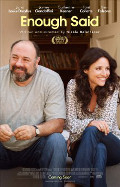
Directed by
Nicole Holofcener
93 minutes
Rated M
Reviewed by
Sharon Hurst

Enough Said
Synopsis: Eva (Julia Louis-Dreyfus) is a divorced mother and professional masseuse. At a party she meets Albert (James Gandolfini), with whom she shares a sense of humour, an attraction and a commonality in both having daughters heading off to college. Eva also befriends bohemian poet and divorced mother, Marianne (Catherine Keener), whom she takes on as a new client. The more Marianne gives forth on what she hates about her ex, the more this affects Eva’s relationship with Albert. When Eva finally twigs that Albert is Marianne’s ex, she opts for concealment and her life and new relationship go into a tailspin.
Please, please do not dismiss this film, based upon its synopsis as just another rom-com, or chick-flick. These almost perjorative terms in no way relate to the smart, witty touching story that gets to the heart of many issues common to divorced, middle-aged people today. Holofcener, who also wrote the screenplay, has an uncanny knack of nailing the feelings and conversations of her characters, and I defy most viewers in the film’s demographic not to both cringe and laugh as they recognise themselves.
The delicious but uncomfortable main premise (already revealed in the trailer, so no spoiler here) is in some ways at the heart of one of the film’s main themes. What is it that makes people attracted, or repulsed by each other? If one person finds another impossible to live with, does that mean no-one else could find this person suitable as a partner? If other people do not like your partner, and tell you so, does this affect how you perceive that person? And how important is friendship and general compatibility as opposed to physical attraction?
Whilst Albert is certainly no pin-up boy, his warmth, humour and unassuming nature make him an easy companion for Eva. Attraction only grows later. Many older divorced viewers will recognise the uncomfortable issues surrounding body self-image and the awkwardness of middle-aged sex with new partners, but it is Holofcener’s uncanny knack for capturing this in such a truthful and gently humorous manner that makes Enough Said so delightful. Most viewers in relationships in which the gloss has worn off will also recognise only too well the small irritations that create friction between partners.
Louis-Dreyfus, well-known as Elaine from Seinfeld, is pitch-perfect as Eva, whilst Keener, a favourite of the director, lives up to her fine acting track record as the vaguely bohemian, outspoken Marianne. Toni Collette complements the cast well, as a close friend of Eva and whose own relationship with husband, Will (Ben Falcone), has a character many viewers will recognise. Gandolfini, best known for his role as tough mob boss in The Sopranos, is marvellous. Like a big cuddly bear, he invests Albert with compassion, intelligence, and a winning sense of humour, even if physically he is hugely overweight. Both Eva and Albert grapple with the issues of parenting and for Eva what will her life will be when she is no longer actively a mother. Tracey Fairaway is Ellen, Eva’s daughter, and again the familiar theme of mother/daughter relationship comes out poignantly as Eva and Ellen have issues relating while Chloe (Tavi Gavinson), Ellen’s friend who can’t relate to her own mother, seems to seamlessly slip into Eva’s life. Meanwhile Tess (Eve Hewson), Albert and Marianne’s daughter is brash, offhand, outspoken and too smart for her own good. All these three young actresses play small but significant roles, acquitting themselves well.
It is testament to the film that I went with a newly-separated friend who related to so much of the recognisable and truthful stuff about what destroys a relationship. We elbowed each other knowingly through so many of the scenes, laughed gleefully through some, and were very moved in others. Such a film which captures the pain, joy and truthfulness of life is to be relished.

Want more about this film?


Want something different?




